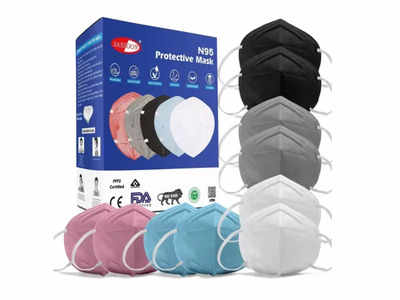Researchers develop N95 face masks that can kill viruses – Times of India

Researchers at Rensselaer Polytechnic Institute (RPI) in New York have developed a method that gives antiviral and antibacterial properties to N95 face mask filters. They found that incorporating materials with antiviral properties into face masks improved their ability to protect against infection. The team claims that these antiviral, antibacterial masks can be worn longer, causing less plastic waste as the masks do not need to be replaced as frequently.
Helen Zha, assistant professor of chemical and biological engineering and a member of the Center for Biotechnology and Interdisciplinary Studies at Rensselaer (CBIS), collaborated with Edmund Palermo, associate professor of materials science and engineering and a member of the Center for Materials, Devices, and Integrated systems (cMDIS) at Rensselaer, to device a way to improve face masks.
How the N95 face mask was modified
As research published in Applied ACS Materials and Interfaces says, the team successfully grafted broad-spectrum antimicrobial polymers onto the polypropylene filters used in N95 face masks.
“The active filtration layers in N95 masks are very sensitive to chemical modification,” said Zha. “It can make them perform worse in terms of filtration, so they essentially no longer perform like N95s. They’re made out of polypropylene, which is difficult to chemically modify. Another challenge is that you don’t want to disrupt the very fine network of fibers in these masks, which might make them more difficult to breathe through.”
Zha and Palermo, along with other researchers covalently attached antimicrobial quaternary ammonium polymers to the fiber surfaces of nonwoven polypropylene fabrics using ultraviolet (UV)-initiated grafting. “The process that we developed uses a really simple chemistry to create this non-leaching polymer coating that can kill viruses and bacteria by essentially breaking open their outer layer,” said Zha. “It’s very straightforward and a potentially scalable method.”
The team used only UV light and acetone in their process, which are widely available, to make it easy to implement. This process can also be applied to already manufactured polypropylene filters, rather than necessitating the development of new ones.
The team, however, says that it did see a decrease in filtration efficiency when the process was applied directly to the filtration layer of N95 masks, but the solution is straightforward. The user can wear an unaltered N95 mask along with another polypropylene layer with the antimicrobial polymer on top.
This means that in the future, manufacturers can make a mask with the antimicrobial polymer incorporated into the top layer.
Earlier this year, a team of Indian Scientists in collaboration with an industry partner developed a self-disinfecting ‘Copper-based Nanoparticle-coated Antiviral Face Mask to fight against the COVID-19 pandemic. The mask exhibits high performance against the COVID 19 virus as well as several other viral and bacterial infections, is biodegradable, highly breathable and washable.
FacebookTwitterInstagramKOO APPYOUTUBE
For all the latest Technology News Click Here

